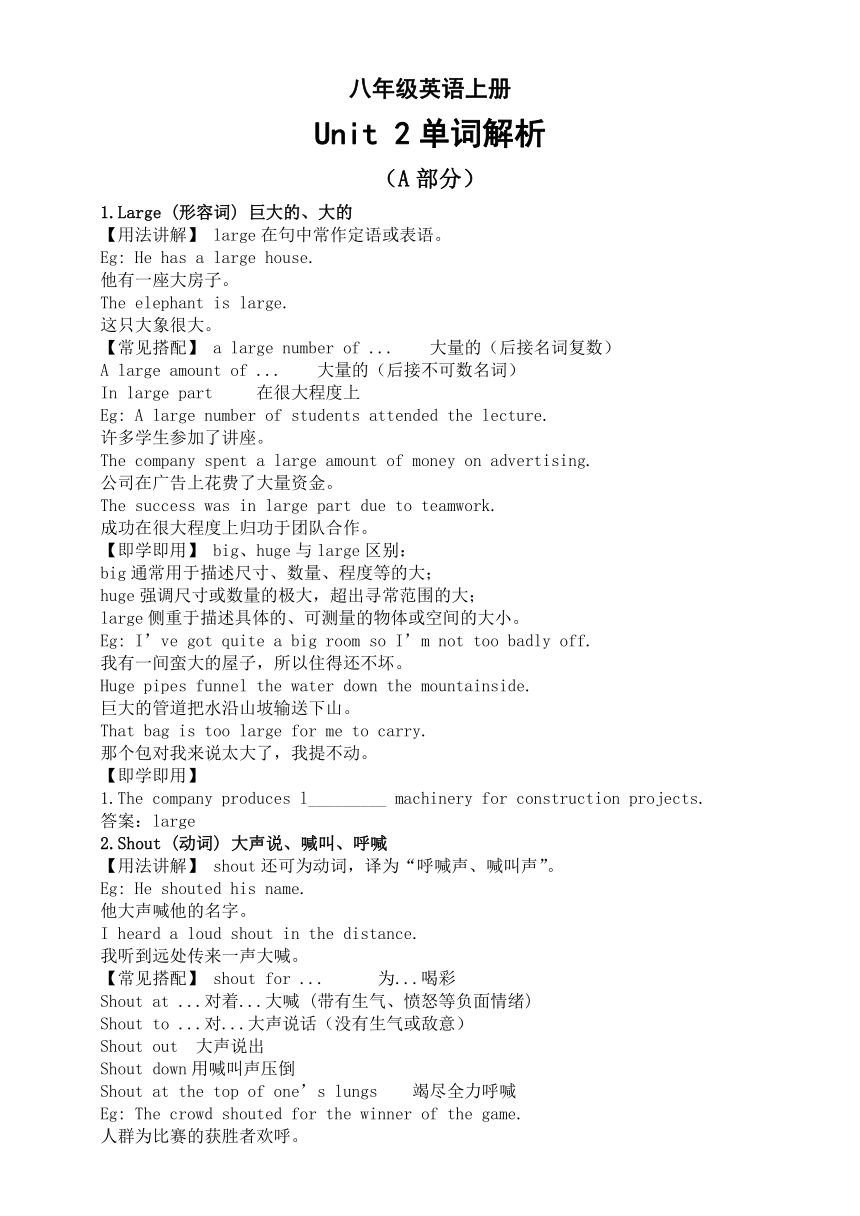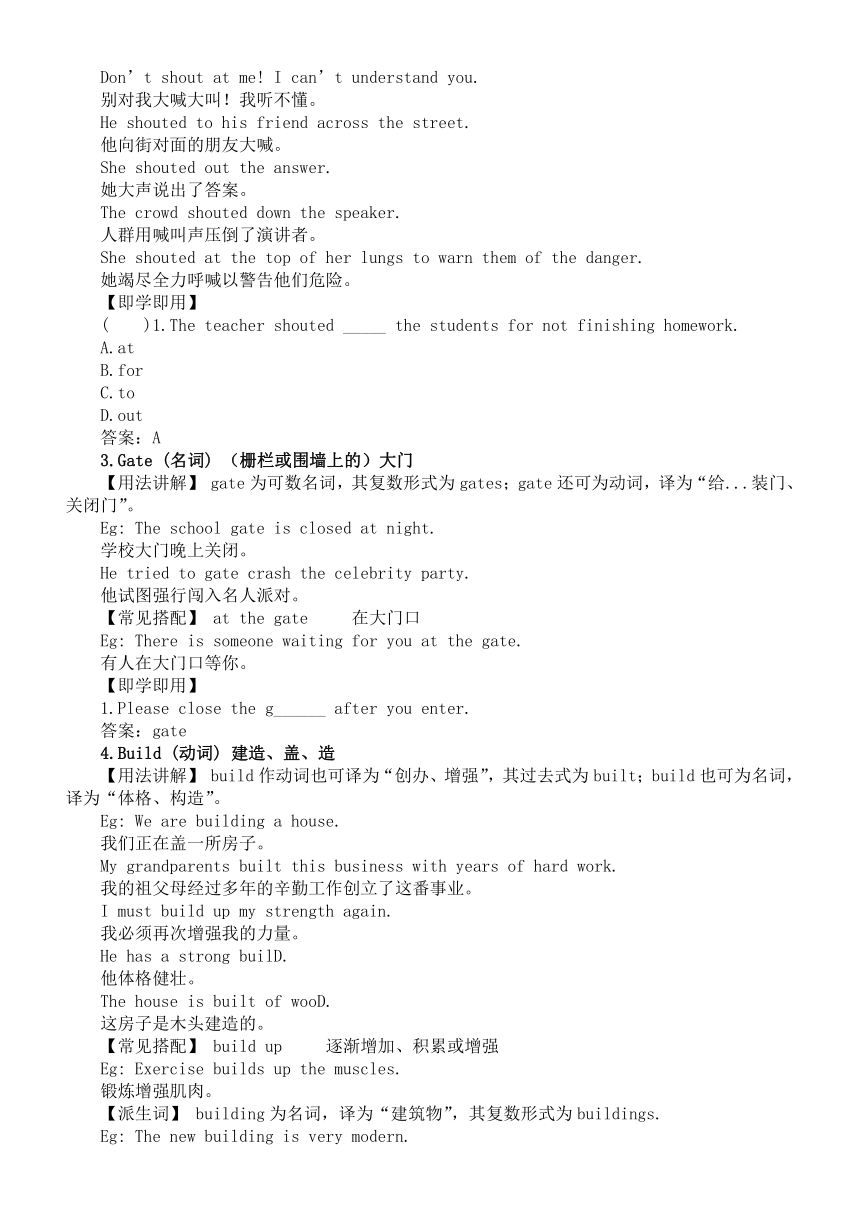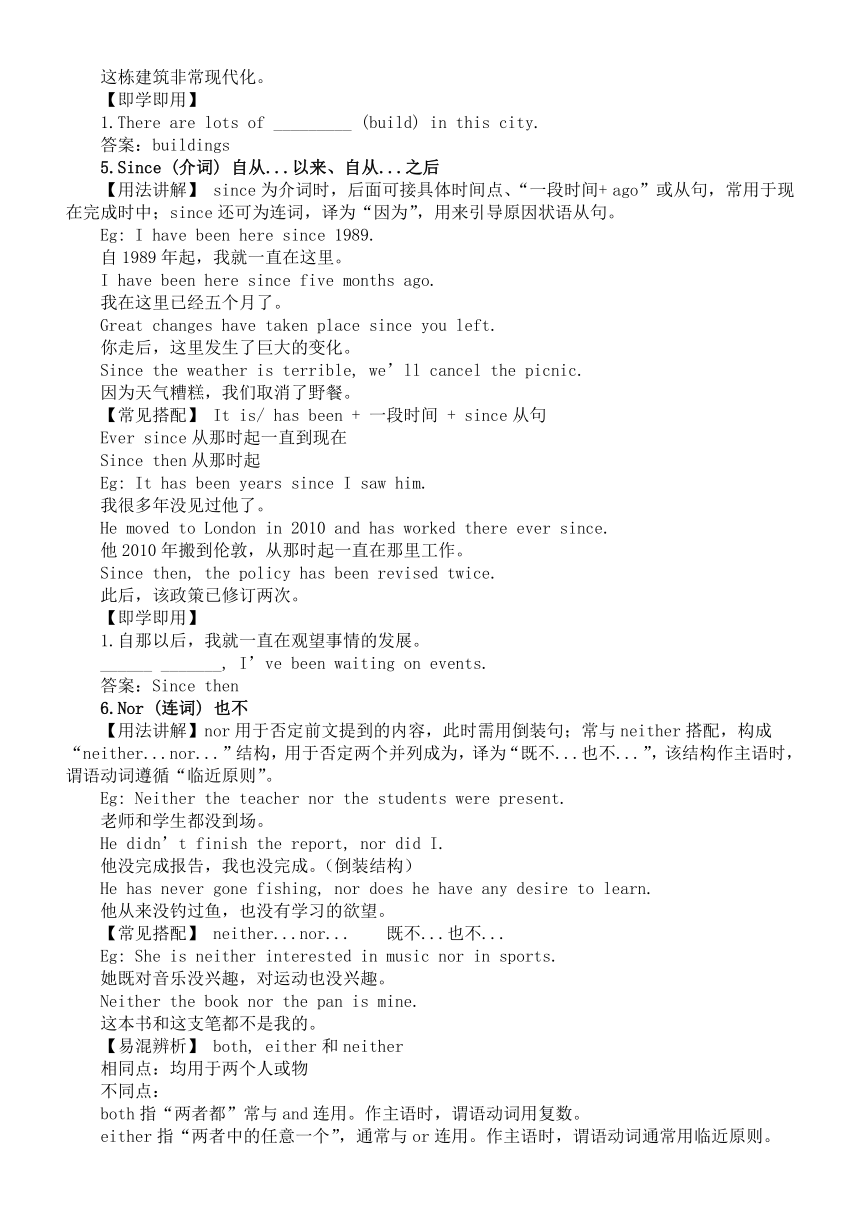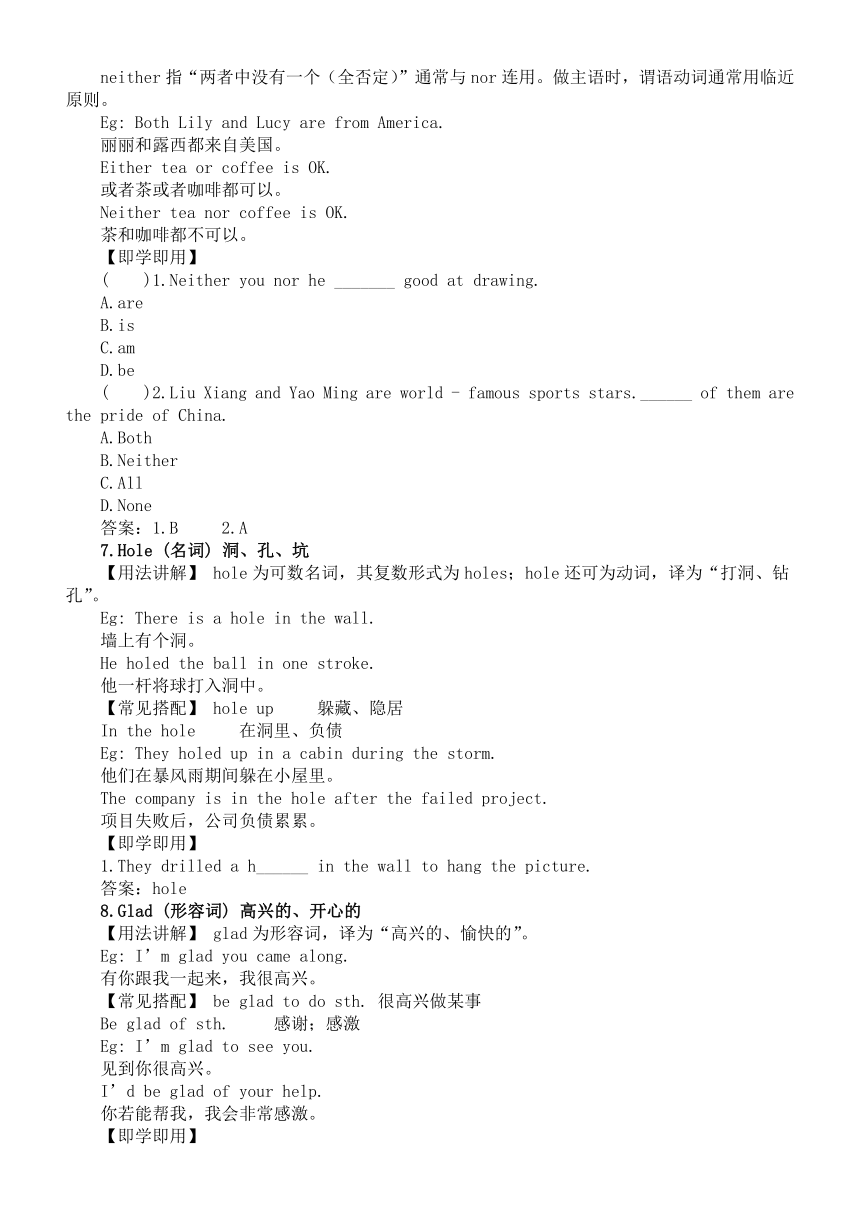Unit2 Getting along单词解析(A部分)外研版(2024)八年级英语上册
文档属性
| 名称 | Unit2 Getting along单词解析(A部分)外研版(2024)八年级英语上册 |  | |
| 格式 | docx | ||
| 文件大小 | 31.8KB | ||
| 资源类型 | 教案 | ||
| 版本资源 | 外研版 | ||
| 科目 | 英语 | ||
| 更新时间 | 2025-07-19 12:14:33 | ||
图片预览




文档简介
八年级英语上册
Unit 2单词解析
(A部分)
1.Large (形容词) 巨大的、大的
【用法讲解】 large在句中常作定语或表语。
Eg: He has a large house.
他有一座大房子。
The elephant is large.
这只大象很大。
【常见搭配】 a large number of ... 大量的(后接名词复数)
A large amount of ... 大量的(后接不可数名词)
In large part 在很大程度上
Eg: A large number of students attended the lecture.
许多学生参加了讲座。
The company spent a large amount of money on advertising.
公司在广告上花费了大量资金。
The success was in large part due to teamwork.
成功在很大程度上归功于团队合作。
【即学即用】 big、huge与large区别:
big通常用于描述尺寸、数量、程度等的大;
huge强调尺寸或数量的极大,超出寻常范围的大;
large侧重于描述具体的、可测量的物体或空间的大小。
Eg: I’ve got quite a big room so I’m not too badly off.
我有一间蛮大的屋子,所以住得还不坏。
Huge pipes funnel the water down the mountainside.
巨大的管道把水沿山坡输送下山。
That bag is too large for me to carry.
那个包对我来说太大了,我提不动。
【即学即用】
1.The company produces l_________ machinery for construction projects.
答案:large
2.Shout (动词) 大声说、喊叫、呼喊
【用法讲解】 shout还可为动词,译为“呼喊声、喊叫声”。
Eg: He shouted his name.
他大声喊他的名字。
I heard a loud shout in the distance.
我听到远处传来一声大喊。
【常见搭配】 shout for ... 为...喝彩
Shout at ...对着...大喊 (带有生气、愤怒等负面情绪)
Shout to ...对...大声说话(没有生气或敌意)
Shout out 大声说出
Shout down用喊叫声压倒
Shout at the top of one’s lungs 竭尽全力呼喊
Eg: The crowd shouted for the winner of the game.
人群为比赛的获胜者欢呼。
Don’t shout at me! I can’t understand you.
别对我大喊大叫!我听不懂。
He shouted to his friend across the street.
他向街对面的朋友大喊。
She shouted out the answer.
她大声说出了答案。
The crowd shouted down the speaker.
人群用喊叫声压倒了演讲者。
She shouted at the top of her lungs to warn them of the danger.
她竭尽全力呼喊以警告他们危险。
【即学即用】
( )1.The teacher shouted _____ the students for not finishing homework.
A.at
B.for
C.to
D.out
答案:A
3.Gate (名词) (栅栏或围墙上的)大门
【用法讲解】 gate为可数名词,其复数形式为gates;gate还可为动词,译为“给...装门、关闭门”。
Eg: The school gate is closed at night.
学校大门晚上关闭。
He tried to gate crash the celebrity party.
他试图强行闯入名人派对。
【常见搭配】 at the gate 在大门口
Eg: There is someone waiting for you at the gate.
有人在大门口等你。
【即学即用】
1.Please close the g______ after you enter.
答案:gate
4.Build (动词) 建造、盖、造
【用法讲解】 build作动词也可译为“创办、增强”,其过去式为built;build也可为名词,译为“体格、构造”。
Eg: We are building a house.
我们正在盖一所房子。
My grandparents built this business with years of hard work.
我的祖父母经过多年的辛勤工作创立了这番事业。
I must build up my strength again.
我必须再次增强我的力量。
He has a strong builD.
他体格健壮。
The house is built of wooD.
这房子是木头建造的。
【常见搭配】 build up 逐渐增加、积累或增强
Eg: Exercise builds up the muscles.
锻炼增强肌肉。
【派生词】 building为名词,译为“建筑物”,其复数形式为buildings.
Eg: The new building is very modern.
这栋建筑非常现代化。
【即学即用】
1.There are lots of _________ (build) in this city.
答案:buildings
5.Since (介词) 自从...以来、自从...之后
【用法讲解】 since为介词时,后面可接具体时间点、“一段时间+ ago”或从句,常用于现在完成时中;since还可为连词,译为“因为”,用来引导原因状语从句。
Eg: I have been here since 1989.
自1989年起,我就一直在这里。
I have been here since five months ago.
我在这里已经五个月了。
Great changes have taken place since you left.
你走后,这里发生了巨大的变化。
Since the weather is terrible, we’ll cancel the picnic.
因为天气糟糕,我们取消了野餐。
【常见搭配】 It is/ has been + 一段时间 + since从句
Ever since从那时起一直到现在
Since then从那时起
Eg: It has been years since I saw him.
我很多年没见过他了。
He moved to London in 2010 and has worked there ever since.
他2010年搬到伦敦,从那时起一直在那里工作。
Since then, the policy has been revised twice.
此后,该政策已修订两次。
【即学即用】
1.自那以后,我就一直在观望事情的发展。
______ _______, I’ve been waiting on events.
答案:Since then
6.Nor (连词) 也不
【用法讲解】nor用于否定前文提到的内容,此时需用倒装句;常与neither搭配,构成“neither...nor...”结构,用于否定两个并列成为,译为“既不...也不...”,该结构作主语时,谓语动词遵循“临近原则”。
Eg: Neither the teacher nor the students were present.
老师和学生都没到场。
He didn’t finish the report, nor did I.
他没完成报告,我也没完成。(倒装结构)
He has never gone fishing, nor does he have any desire to learn.
他从来没钓过鱼,也没有学习的欲望。
【常见搭配】 neither...nor... 既不...也不...
Eg: She is neither interested in music nor in sports.
她既对音乐没兴趣,对运动也没兴趣。
Neither the book nor the pan is mine.
这本书和这支笔都不是我的。
【易混辨析】 both, either和neither
相同点:均用于两个人或物
不同点:
both指“两者都”常与and连用。作主语时,谓语动词用复数。
either指“两者中的任意一个”,通常与or连用。作主语时,谓语动词通常用临近原则。
neither指“两者中没有一个(全否定)”通常与nor连用。做主语时,谓语动词通常用临近原则。
Eg: Both Lily and Lucy are from America.
丽丽和露西都来自美国。
Either tea or coffee is OK.
或者茶或者咖啡都可以。
Neither tea nor coffee is OK.
茶和咖啡都不可以。
【即学即用】
( )1.Neither you nor he _______ good at drawing.
A.are
B.is
C.am
D.be
( )2.Liu Xiang and Yao Ming are world - famous sports stars.______ of them are the pride of China.
A.Both
B.Neither
C.All
D.None
答案:1.B 2.A
7.Hole (名词) 洞、孔、坑
【用法讲解】 hole为可数名词,其复数形式为holes;hole还可为动词,译为“打洞、钻孔”。
Eg: There is a hole in the wall.
墙上有个洞。
He holed the ball in one stroke.
他一杆将球打入洞中。
【常见搭配】 hole up 躲藏、隐居
In the hole 在洞里、负债
Eg: They holed up in a cabin during the storm.
他们在暴风雨期间躲在小屋里。
The company is in the hole after the failed project.
项目失败后,公司负债累累。
【即学即用】
1.They drilled a h______ in the wall to hang the picture.
答案:hole
8.Glad (形容词) 高兴的、开心的
【用法讲解】 glad为形容词,译为“高兴的、愉快的”。
Eg: I’m glad you came along.
有你跟我一起来,我很高兴。
【常见搭配】 be glad to do sth. 很高兴做某事
Be glad of sth. 感谢;感激
Eg: I’m glad to see you.
见到你很高兴。
I’d be glad of your help.
你若能帮我,我会非常感激。
【即学即用】
1.I’d be glad ________ (lend) a hanD.
答案:1.to lend
9.Knock (动词) 碰撞、碰倒、撞倒
Eg: Knock before you enter.
进来前先敲门。
【常见搭配】 knock down 撞倒、降低价格
Knock at/ on ... 敲(门、窗等)
Knock into ... 偶然遇到
Knock off下班、扣除
Knock over 打翻
Knock out使昏迷
Eg: The car knocked down the fence.
车撞倒了栅栏。
I tried to knock the price of the car down, but the seller wouldn’t budge.
我试图压低那辆车的价格,但卖家不肯让步。
Please knock at/ on the door before you enter the room.
进屋前请先敲门。
I knocked into an old friend at the supermarket yesterday.
我昨天在潮湿偶然遇到了一个老朋友。
I usually knock off at 5 pm.
我通常下午5点下班。
The store knocked 20% off the price of all winter clothes.
这家商店把所有冬装的价格降低了20%。
He accidentally knocked over the vase.
他不小心打翻了花瓶。
The powerful punch knocked the boxer out.
这记有力的一拳把拳击手击昏了。
【即学即用】
( )1.I can even _______ walls with my Kongfu.
A.knock at
B.knock down
C.knock off
D.knock out
答案:B
10.Afraid (形容词) 害怕的、恐惧的
【用法讲解】 afraid在句中常位于be动词后面作表语。
Eg: There’s nothing to be afraid of.
没有什么可害怕的。
【常见搭配】 be afraid of sth./ sB. 对某人/某事感到害怕
Be afraid to do sth. 因害怕而不敢做某事
Be afraid of doing sth. 害怕做某事
Be afraid that 从句 害怕...
Be afraid for s
B./ sth. 为某人/某事感到担心
Eg: I’m afraid of spiders.
我害怕蜘蛛。
I am afraid to go alone in the dark.
我害怕在黑暗中独自一人。
She is afraid of speaking in public.
她害怕在公众场合讲话。
She is afraid that she will fail the exam.
她担心她会考试不及格。
I am afraid for her safety.
我担心她的安全。
【即学即用】
1.She is afraid ________ (go) out at night.
答案:to go
11.Message (名词) (电影、书籍、讲话等的)要旨、主题思想、寓意
【用法讲解】 message为可数名词,其复数形式为messages,还可译为“信息、消息”;message还可为动词,译为“通知、发消息”。
Eg: The book’s message is about the importance of love and friendship.
这本书传达的主题思想是关于爱和友谊的重要性。
I received some messages this morning.
我今天早上收到了几条信息。
He messaged me to tell the news.
他给我发信息告诉我这个消息。
【常见搭配】 leave a message 留言
Receive a message 收到信息
Text message 短信
Eg: Would you like to leave a message for her
你想给她留个言吗?
I received a text message from my frienD.
我收到了朋友的短信。
【易混辨析】 Message、information与news的区别:
Information (不可数名词) “信息;消息”常指通过观察、学习、调查或交谈所获得的消息、情报及资料等。在表示信息数量时,可以用“数词 + 量词 + of + 不可数名词”的结构,也可用some/much/a little等修饰。
Message (可数名词)“消息;电报”;常指口头、书面、无线电等多种渠道传送的信息等。
News (不可数名词) “新闻”;常指通过电视、报纸、广播等新闻媒体向大众发布的各种最新消息。
Eg: You can search for the information on the Internet.
你可以在网上搜寻信息。
I can leave a message for you.
我可以为你捎个口信。
I have got good news for you.
我有好消息告诉你。
【即学即用】
( )1.I left a _______ for him on the voicemail.
A.message
B.information
C.news
答案:A
12.Double (形容词) 双倍的、两倍的
【用法讲解】 double还可为副词,译为“双重地、两倍地”;double还可为动词,译为“加倍”。
Eg: I want a double espresso.
我要一杯双份浓缩咖啡。
He worked double hard to finish the project.
他为了完成这个项目加倍努力工作。
The population doubled within 50 years.
人口在50年内犯了一番。
【即学即用】
1.This room has a ________ (双倍的) beD.
答案:double
13.Introduction (名词) 开始
【用法讲解】 introduction为可数名词,其复数形式为introductions。
Eg: Please allow me to make an introduction.
请允许我做个介绍。
【派生词】 Introduce为动词,译为“介绍”。
【常见搭配】Introduce oneself 自我介绍
Introduce sB.to sB. 把某人介绍某人
Eg: Please introduce yourself.
请你做一个自我介绍。
Please introduce me to Mr.Wang.
请把我介绍给王先生。
【即学即用】
1.This course is an ____________ (introduce) to computing science.
答案:introduction
14.Return (动词) 返回、回来、回去
【用法讲解】 return还可为名词,译为“返回、回来、恢复”。
Eg: He will return home tomorrow.
我明天会回家。
The patient is slowly returning to health.
病人正在逐渐恢复健康。
The return of the investment was very high.
这项投资的回报率很高。
【常见搭配】 return sth.to s
B./ sth. 把某物归还给某人/某处
Return to + 地点 = go back to 地点 回到某地
In return作为回报(强调一种行为或态度的回应)
In return for ... 作为对...的回报(强调一种明确的、具体的交换关系)
Eg: I returned the book to the library.
我把书还给了图书馆。
They will return to the office after the meeting.
会议结束后,他们会返回办公室。
She helped me move, and I cooked dinner in return.
她帮我搬东西,作为回报我做晚饭。
He gave me a gift in return for my help.
他给了我一份礼物以报答我的帮助。
【即学即用】
( )1.I don’t know when we will _______ Beijing.
A.return back
B.return to
C.return back to
D.return
答案:B
15.Lively (形容词) 充满活力的、生气勃勃的
Eg: She is very lively and full of fun.
她很活泼,挺有趣的。
【易混辨析】 alive, living, lovely及lively区别
lively强调其生机、有活力的特性;
alive强调生命的存在或活力,通常用于描述物体或人的生存状态;
living强调生物体的生存状态,也可指生活方式或居住环境;
Lovely强调可爱或令人愉悦的特质,常用来形容人或物给人的美好感觉。
Eg: She had a sweet, lively personality.
她的性格可爱活泼。
We don’t know whether he’s alive or deaD.
我们不知道他是死是活。
She is a living legenD.
她是一个活生生的传奇人物。
She is a lovely girl.
她是一个可爱的女孩。
【即学即用】
( )1.She is a ________ girl who is easy - going.
A.lovely
B.alive
C.living
D.lively
答案:D
Unit 2单词解析
(A部分)
1.Large (形容词) 巨大的、大的
【用法讲解】 large在句中常作定语或表语。
Eg: He has a large house.
他有一座大房子。
The elephant is large.
这只大象很大。
【常见搭配】 a large number of ... 大量的(后接名词复数)
A large amount of ... 大量的(后接不可数名词)
In large part 在很大程度上
Eg: A large number of students attended the lecture.
许多学生参加了讲座。
The company spent a large amount of money on advertising.
公司在广告上花费了大量资金。
The success was in large part due to teamwork.
成功在很大程度上归功于团队合作。
【即学即用】 big、huge与large区别:
big通常用于描述尺寸、数量、程度等的大;
huge强调尺寸或数量的极大,超出寻常范围的大;
large侧重于描述具体的、可测量的物体或空间的大小。
Eg: I’ve got quite a big room so I’m not too badly off.
我有一间蛮大的屋子,所以住得还不坏。
Huge pipes funnel the water down the mountainside.
巨大的管道把水沿山坡输送下山。
That bag is too large for me to carry.
那个包对我来说太大了,我提不动。
【即学即用】
1.The company produces l_________ machinery for construction projects.
答案:large
2.Shout (动词) 大声说、喊叫、呼喊
【用法讲解】 shout还可为动词,译为“呼喊声、喊叫声”。
Eg: He shouted his name.
他大声喊他的名字。
I heard a loud shout in the distance.
我听到远处传来一声大喊。
【常见搭配】 shout for ... 为...喝彩
Shout at ...对着...大喊 (带有生气、愤怒等负面情绪)
Shout to ...对...大声说话(没有生气或敌意)
Shout out 大声说出
Shout down用喊叫声压倒
Shout at the top of one’s lungs 竭尽全力呼喊
Eg: The crowd shouted for the winner of the game.
人群为比赛的获胜者欢呼。
Don’t shout at me! I can’t understand you.
别对我大喊大叫!我听不懂。
He shouted to his friend across the street.
他向街对面的朋友大喊。
She shouted out the answer.
她大声说出了答案。
The crowd shouted down the speaker.
人群用喊叫声压倒了演讲者。
She shouted at the top of her lungs to warn them of the danger.
她竭尽全力呼喊以警告他们危险。
【即学即用】
( )1.The teacher shouted _____ the students for not finishing homework.
A.at
B.for
C.to
D.out
答案:A
3.Gate (名词) (栅栏或围墙上的)大门
【用法讲解】 gate为可数名词,其复数形式为gates;gate还可为动词,译为“给...装门、关闭门”。
Eg: The school gate is closed at night.
学校大门晚上关闭。
He tried to gate crash the celebrity party.
他试图强行闯入名人派对。
【常见搭配】 at the gate 在大门口
Eg: There is someone waiting for you at the gate.
有人在大门口等你。
【即学即用】
1.Please close the g______ after you enter.
答案:gate
4.Build (动词) 建造、盖、造
【用法讲解】 build作动词也可译为“创办、增强”,其过去式为built;build也可为名词,译为“体格、构造”。
Eg: We are building a house.
我们正在盖一所房子。
My grandparents built this business with years of hard work.
我的祖父母经过多年的辛勤工作创立了这番事业。
I must build up my strength again.
我必须再次增强我的力量。
He has a strong builD.
他体格健壮。
The house is built of wooD.
这房子是木头建造的。
【常见搭配】 build up 逐渐增加、积累或增强
Eg: Exercise builds up the muscles.
锻炼增强肌肉。
【派生词】 building为名词,译为“建筑物”,其复数形式为buildings.
Eg: The new building is very modern.
这栋建筑非常现代化。
【即学即用】
1.There are lots of _________ (build) in this city.
答案:buildings
5.Since (介词) 自从...以来、自从...之后
【用法讲解】 since为介词时,后面可接具体时间点、“一段时间+ ago”或从句,常用于现在完成时中;since还可为连词,译为“因为”,用来引导原因状语从句。
Eg: I have been here since 1989.
自1989年起,我就一直在这里。
I have been here since five months ago.
我在这里已经五个月了。
Great changes have taken place since you left.
你走后,这里发生了巨大的变化。
Since the weather is terrible, we’ll cancel the picnic.
因为天气糟糕,我们取消了野餐。
【常见搭配】 It is/ has been + 一段时间 + since从句
Ever since从那时起一直到现在
Since then从那时起
Eg: It has been years since I saw him.
我很多年没见过他了。
He moved to London in 2010 and has worked there ever since.
他2010年搬到伦敦,从那时起一直在那里工作。
Since then, the policy has been revised twice.
此后,该政策已修订两次。
【即学即用】
1.自那以后,我就一直在观望事情的发展。
______ _______, I’ve been waiting on events.
答案:Since then
6.Nor (连词) 也不
【用法讲解】nor用于否定前文提到的内容,此时需用倒装句;常与neither搭配,构成“neither...nor...”结构,用于否定两个并列成为,译为“既不...也不...”,该结构作主语时,谓语动词遵循“临近原则”。
Eg: Neither the teacher nor the students were present.
老师和学生都没到场。
He didn’t finish the report, nor did I.
他没完成报告,我也没完成。(倒装结构)
He has never gone fishing, nor does he have any desire to learn.
他从来没钓过鱼,也没有学习的欲望。
【常见搭配】 neither...nor... 既不...也不...
Eg: She is neither interested in music nor in sports.
她既对音乐没兴趣,对运动也没兴趣。
Neither the book nor the pan is mine.
这本书和这支笔都不是我的。
【易混辨析】 both, either和neither
相同点:均用于两个人或物
不同点:
both指“两者都”常与and连用。作主语时,谓语动词用复数。
either指“两者中的任意一个”,通常与or连用。作主语时,谓语动词通常用临近原则。
neither指“两者中没有一个(全否定)”通常与nor连用。做主语时,谓语动词通常用临近原则。
Eg: Both Lily and Lucy are from America.
丽丽和露西都来自美国。
Either tea or coffee is OK.
或者茶或者咖啡都可以。
Neither tea nor coffee is OK.
茶和咖啡都不可以。
【即学即用】
( )1.Neither you nor he _______ good at drawing.
A.are
B.is
C.am
D.be
( )2.Liu Xiang and Yao Ming are world - famous sports stars.______ of them are the pride of China.
A.Both
B.Neither
C.All
D.None
答案:1.B 2.A
7.Hole (名词) 洞、孔、坑
【用法讲解】 hole为可数名词,其复数形式为holes;hole还可为动词,译为“打洞、钻孔”。
Eg: There is a hole in the wall.
墙上有个洞。
He holed the ball in one stroke.
他一杆将球打入洞中。
【常见搭配】 hole up 躲藏、隐居
In the hole 在洞里、负债
Eg: They holed up in a cabin during the storm.
他们在暴风雨期间躲在小屋里。
The company is in the hole after the failed project.
项目失败后,公司负债累累。
【即学即用】
1.They drilled a h______ in the wall to hang the picture.
答案:hole
8.Glad (形容词) 高兴的、开心的
【用法讲解】 glad为形容词,译为“高兴的、愉快的”。
Eg: I’m glad you came along.
有你跟我一起来,我很高兴。
【常见搭配】 be glad to do sth. 很高兴做某事
Be glad of sth. 感谢;感激
Eg: I’m glad to see you.
见到你很高兴。
I’d be glad of your help.
你若能帮我,我会非常感激。
【即学即用】
1.I’d be glad ________ (lend) a hanD.
答案:1.to lend
9.Knock (动词) 碰撞、碰倒、撞倒
Eg: Knock before you enter.
进来前先敲门。
【常见搭配】 knock down 撞倒、降低价格
Knock at/ on ... 敲(门、窗等)
Knock into ... 偶然遇到
Knock off下班、扣除
Knock over 打翻
Knock out使昏迷
Eg: The car knocked down the fence.
车撞倒了栅栏。
I tried to knock the price of the car down, but the seller wouldn’t budge.
我试图压低那辆车的价格,但卖家不肯让步。
Please knock at/ on the door before you enter the room.
进屋前请先敲门。
I knocked into an old friend at the supermarket yesterday.
我昨天在潮湿偶然遇到了一个老朋友。
I usually knock off at 5 pm.
我通常下午5点下班。
The store knocked 20% off the price of all winter clothes.
这家商店把所有冬装的价格降低了20%。
He accidentally knocked over the vase.
他不小心打翻了花瓶。
The powerful punch knocked the boxer out.
这记有力的一拳把拳击手击昏了。
【即学即用】
( )1.I can even _______ walls with my Kongfu.
A.knock at
B.knock down
C.knock off
D.knock out
答案:B
10.Afraid (形容词) 害怕的、恐惧的
【用法讲解】 afraid在句中常位于be动词后面作表语。
Eg: There’s nothing to be afraid of.
没有什么可害怕的。
【常见搭配】 be afraid of sth./ sB. 对某人/某事感到害怕
Be afraid to do sth. 因害怕而不敢做某事
Be afraid of doing sth. 害怕做某事
Be afraid that 从句 害怕...
Be afraid for s
B./ sth. 为某人/某事感到担心
Eg: I’m afraid of spiders.
我害怕蜘蛛。
I am afraid to go alone in the dark.
我害怕在黑暗中独自一人。
She is afraid of speaking in public.
她害怕在公众场合讲话。
She is afraid that she will fail the exam.
她担心她会考试不及格。
I am afraid for her safety.
我担心她的安全。
【即学即用】
1.She is afraid ________ (go) out at night.
答案:to go
11.Message (名词) (电影、书籍、讲话等的)要旨、主题思想、寓意
【用法讲解】 message为可数名词,其复数形式为messages,还可译为“信息、消息”;message还可为动词,译为“通知、发消息”。
Eg: The book’s message is about the importance of love and friendship.
这本书传达的主题思想是关于爱和友谊的重要性。
I received some messages this morning.
我今天早上收到了几条信息。
He messaged me to tell the news.
他给我发信息告诉我这个消息。
【常见搭配】 leave a message 留言
Receive a message 收到信息
Text message 短信
Eg: Would you like to leave a message for her
你想给她留个言吗?
I received a text message from my frienD.
我收到了朋友的短信。
【易混辨析】 Message、information与news的区别:
Information (不可数名词) “信息;消息”常指通过观察、学习、调查或交谈所获得的消息、情报及资料等。在表示信息数量时,可以用“数词 + 量词 + of + 不可数名词”的结构,也可用some/much/a little等修饰。
Message (可数名词)“消息;电报”;常指口头、书面、无线电等多种渠道传送的信息等。
News (不可数名词) “新闻”;常指通过电视、报纸、广播等新闻媒体向大众发布的各种最新消息。
Eg: You can search for the information on the Internet.
你可以在网上搜寻信息。
I can leave a message for you.
我可以为你捎个口信。
I have got good news for you.
我有好消息告诉你。
【即学即用】
( )1.I left a _______ for him on the voicemail.
A.message
B.information
C.news
答案:A
12.Double (形容词) 双倍的、两倍的
【用法讲解】 double还可为副词,译为“双重地、两倍地”;double还可为动词,译为“加倍”。
Eg: I want a double espresso.
我要一杯双份浓缩咖啡。
He worked double hard to finish the project.
他为了完成这个项目加倍努力工作。
The population doubled within 50 years.
人口在50年内犯了一番。
【即学即用】
1.This room has a ________ (双倍的) beD.
答案:double
13.Introduction (名词) 开始
【用法讲解】 introduction为可数名词,其复数形式为introductions。
Eg: Please allow me to make an introduction.
请允许我做个介绍。
【派生词】 Introduce为动词,译为“介绍”。
【常见搭配】Introduce oneself 自我介绍
Introduce sB.to sB. 把某人介绍某人
Eg: Please introduce yourself.
请你做一个自我介绍。
Please introduce me to Mr.Wang.
请把我介绍给王先生。
【即学即用】
1.This course is an ____________ (introduce) to computing science.
答案:introduction
14.Return (动词) 返回、回来、回去
【用法讲解】 return还可为名词,译为“返回、回来、恢复”。
Eg: He will return home tomorrow.
我明天会回家。
The patient is slowly returning to health.
病人正在逐渐恢复健康。
The return of the investment was very high.
这项投资的回报率很高。
【常见搭配】 return sth.to s
B./ sth. 把某物归还给某人/某处
Return to + 地点 = go back to 地点 回到某地
In return作为回报(强调一种行为或态度的回应)
In return for ... 作为对...的回报(强调一种明确的、具体的交换关系)
Eg: I returned the book to the library.
我把书还给了图书馆。
They will return to the office after the meeting.
会议结束后,他们会返回办公室。
She helped me move, and I cooked dinner in return.
她帮我搬东西,作为回报我做晚饭。
He gave me a gift in return for my help.
他给了我一份礼物以报答我的帮助。
【即学即用】
( )1.I don’t know when we will _______ Beijing.
A.return back
B.return to
C.return back to
D.return
答案:B
15.Lively (形容词) 充满活力的、生气勃勃的
Eg: She is very lively and full of fun.
她很活泼,挺有趣的。
【易混辨析】 alive, living, lovely及lively区别
lively强调其生机、有活力的特性;
alive强调生命的存在或活力,通常用于描述物体或人的生存状态;
living强调生物体的生存状态,也可指生活方式或居住环境;
Lovely强调可爱或令人愉悦的特质,常用来形容人或物给人的美好感觉。
Eg: She had a sweet, lively personality.
她的性格可爱活泼。
We don’t know whether he’s alive or deaD.
我们不知道他是死是活。
She is a living legenD.
她是一个活生生的传奇人物。
She is a lovely girl.
她是一个可爱的女孩。
【即学即用】
( )1.She is a ________ girl who is easy - going.
A.lovely
B.alive
C.living
D.lively
答案:D
同课章节目录
